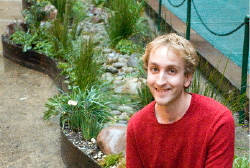Student Profile: Colin Schumacher
The Rain Taker has transformed Russell Courtyard into a filter that eliminates pollutants from storm runoff
Last year, as an apprentice teacher, Colin Schumacher started a garden club with his fifth graders at P.S. 179 in the South Bronx. Schumacher, who’s working toward his Master’s in Inclusive Elementary Education and Teaching Students with Disabilities, has since moved on to another field placement, but he’s still planting seeds: this fall, he can often be found tending the new rain garden located in TC’s Russell Courtyard. Designed by Alive Structures, the rain garden—a collection of native river plants intended to catch storm runoff and eliminate pollutants in the water supply—was made possible by a $10,000 FilterForGood Eco-Challenge Grant from Brita, Inc., which Schumacher obtained last year.
In an ideal world, polluted storm water would wind up in water treatment facilities, but in New York City, there aren’t enough treatment facilities to handle the volume. As a result, sewage ends up in the rivers.
“Rain gardens are particularly important in New York City, where storm water is combined with sewage,” says Schumacher. “It all goes into the same pipes.”
A member of TC’s Go Green Committee, Schumacher is working with the College to create “a multifaceted ecological demonstration site,” and is using it to educate everyone from the preschoolers with whom he’s now working at TC’s Rita Gold Early Childhood Center to chance passersby. He is working with Alive Structures and Pamela Koch, Executive Director of TC’s Center for Food & Environment, to enhance the project with interpretive signs, a new vegetable garden, a rain barrel for watering purposes (to avoid wasting tap water), and a compost center.
Schumacher says he got the idea for the rain garden from his upbringing in Wisconsin. “In the Midwest, it’s popular for homeowners to replace parts of their lawns with native plants in order to control runoff,” he says. “Native grasses have deep root systems that are better at catching and soaking up the rain, which keeps water out of the streets and out of people’s basements.”
As an undergraduate at Hamline University, Schumacher won the Eliza A. Drew Prize in Environmental Studies for research he did on large dam projects in Canada. He also interned for Anishinaabekwe activist Winona LaDuke at the White Earth Land Recovery Project in northern Minnesota.
At TC, he says, his environmental efforts have “gotten nothing but support. The people here are so positive. Instead of saying, ‘Here are the problems we’re going to run into,’ they’re always asking, ‘How can we do this?’ or ‘Let’s make this happen.’”
Published Monday, Nov. 22, 2010
